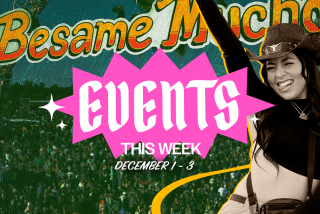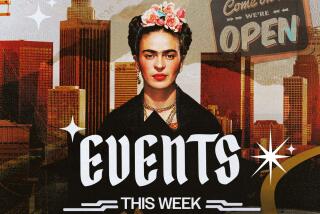Hula Festival Lures the Faithful
- Share via
It’s Labor Day weekend, and Betty Kane cannot imagine being anywhere but here -- at the ninth annual E Hula Mau, a celebration of hula dancing, chanting and all things Hawaiian.
So eager was Kane to join in the three-day festival at the Long Beach Performing Arts Center that she cut short a business trip to -- where else? -- Hawaii and flew back to the mainland on Thursday night.
Now it’s Saturday afternoon and she’s enjoying Thai noodles, Japanese cole slaw, rice balls and Hawaiian corned-beef patties with members of her extended family, the Naluais and the Kiilehuas. The family is spread out in California these days, but one weekend a year it’s Long Beach and E Hula Mau or bust.
“The families, the food, the dancing, the kids, it’s the high point of our year,” said Kane, who lives in Oakland.
Sponsored by Na Mamo (the Cherished Offspring), an Orange County-based nonprofit group of expatriate Hawaiians and Hawaii loyalists, E Hula Mau is proof of the drawing power and cultural durability of that rhythmic, storytelling form of dance called hula.
Contestants in the hula and chanting competition come from throughout California and from the unrecognized hula hot spots of Texas and Oklahoma.
The event, which ends today, draws an estimated 6,000 people a day.
And though there are lectures about lei-making and Hawaiian native medicine, and booths selling Korean barbecue, Hawaiian popcorn and Hawaiian-themed trinkets, it’s hula -- sometimes seductive, sometimes raucous -- that’s the big draw.
“Hula is universal,” said Malia Craver, who judged contestants on their fidelity to the Hawaiian language.
“Hula is a way of life,” said Jolinda Goodrich of La Verne, who married her husband, Robert, a postal inspector, on the beach at Hilo. “Even though we’re not Hawaiian, we try to live the Hawaiian way, with aloha and love for everybody.”
Southern California, particularly Orange County and coastal Los Angeles County, is chockablock with Hawaiian groups and Hawaiian tinged activities.
In two weeks, “The Queen and the Bishop,” a play about Hawaiian Queen Liliuokalani opens at Whittier College. And next month, the second annual ukulele festival is set for Cerritos. In November, a Hawaiian concert is set for Redondo Beach.
Sometimes there are so many Hawaiian events in Southern California, they bump each other.
Even as E Hula Mau was underway, the Hollywood Park Casino in Inglewood was hip-deep in two days of Hawaiian food, dance and music. For hula lovers, life is never without opportunities.
“Hula is every weekend for us,” said Bill St. Aubin of Chula Vista, whose wife and daughters are part of the Napua Ilima ‘O Kehaulani troupe. “When your kids are doing hula, you don’t have to worry about them getting into trouble.”
Although mellowness is the preferred mood at E Hula Mau, there is one thing that can get hula devotees ornery: the cliche that says hula is just about shaking hips, grass skirts and coconut brassieres.
“Yes, that’s hula, but hula is much, much more than that,” said Kalani Weiner, a bookkeeper from San Diego who fell in love with hula while her Navy-pilot husband was stationed at Pearl Harbor. So in love with hula that she took a Hawaiian name.
“Hula can be soft or warlike or very feminine,” she said. “Hula adapts to the mood and the story.”
Hula, for example, has taken hold in the Midwest.
Charla Kanehele, a computer programmer in Oklahoma City, said the stretch of Interstate 35 between Oklahoma City and Dallas “is bumper to bumper every Saturday with people going to Dallas for hula.”
Texas hula-ists have even created their own version of the flower lei, a necklace formed of reddish beads called mountain laurel seeds.
“That way hula is still hula but with something Texas added,” said Kanehele, whose husband is Hawaiian. The couple moved to Oklahoma when a hurricane blew down their home in Hawaii. Economics and family considerations keep them from moving back.
“Maybe we’ll never return to Hawaii,” she said during a break in the hula competition. “But we’ll always have hula.”
More to Read
The biggest entertainment stories
Get our big stories about Hollywood, film, television, music, arts, culture and more right in your inbox as soon as they publish.
You may occasionally receive promotional content from the Los Angeles Times.










